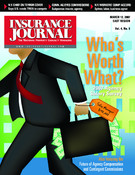A continuing federal role in terrorism insurance is important so that U.S. financial centers including New York City can continue to compete with international markets, many of which are already covered by similar government insurance programs, New York Acting Superintendent of Insurance Eric Dinallo told a Congressional panel in Manhattan recently.
Dinallo told federal lawmakers that relying solely upon private markets to provide terrorism insurance would mean that only businesses in New York City, Washington, Chicago, Houston and other large cities seen as targets would buy terrorism insurance.
“Thus, instead of the risk being shared or pooled, it would be concentrated. That would increase the cost of doing business in our largest cities and hurt their ability to compete with cities in other countries, especially those which do provide a government backstop for terrorism insurance,” the state insurance regulator said in urging renewal of the Terrorism Risk Insurance Extension Act (TRIEA), which will expire at the end of the year unless Congress acts.
Dinallo made his remarks before a subcommittee of the House Committee on Financial Services, which came to Manhattan to hear views on extending the federal terrorism insurance program.
Dinallo said that in addition to a federal backstop, private markets and even local governments must continue to do their part to deal with the risk of terrorism.
Noting that New York State and its business community spend billions of dollars to reduce the risk of future terrorism, despite the presence of the federal government program, he argued that the federal government must also recognize the benefits of concentrated financial centers.
“It is not realistic to spread the financial services industry throughout the country, so there is no one financial capital vulnerable to attack. There are still many strong benefits to concentration,” he argued. “That’s why the competition for New York comes from other financial centers, such as London, Tokyo and Hong Kong. And if New York is no longer the world financial capital, the alternative is not going to be another city in America, it’s likely to be one of those foreign cities that are already competing for that title.”
In addition to government, the private insurance market must do its part, Dinallo stressed.
“I don’t believe in letting the insurance industry completely off the hook. Quite the opposite, it is essential that we continue to take measures to increase the private market’s ability to take on as much terrorism risk as possible,” he testified.
Dinallo cited an estimate by the American Academy of Actuaries that a large nuclear, biological, chemical or radiological (NBCR) event in downtown Manhattan could cause insured losses (property/casualty and group life insurance) of $778 billion. However, he cautioned, in 2005 the aggregate capital for all property and casualty lines was $427 billion and less than half of that is used to support the insuring of commercial enterprises.
“Obviously, even a small number of huge possible losses of that size will substantially increase the mean, pushing premiums to unaffordable levels,” he explained. “What the federal backstop does is eliminate the very, very large losses and thus cuts off the tail. That substantially reduces the mean and thus reduces premiums that insurers must charge and makes them more affordable.”
He said if the country were to rely solely upon private markets without a government backstop, insurers would have to charge to cover the largest potential risks and prices would rise so high that only those who “absolutely had to buy terrorism insurance would do so.”
He warned of dire economic consequences if Congress fails to renew TREIA so that coverage is in place as of Jan. 1, 2008.
“Without a federal backstop, property insurance, especially in our urban cities, will become unavailable or unaffordable. Trophy properties across the nation, including hospitals, stadiums, and government buildings, will be significantly impacted and real estate and construction projects could come to a standstill,” Dinallo argued.
At the same hearing in the heart of the world’s financial markets, insurance agents and companies also urged Congress to protect the country’s economic stability by ensuring availability of terrorism risk insurance through a continued federal role.
The Independent Insurance Agents & Brokers of America and the National Assocation of Professional Insurance Agents were among the groups submitting testimmony to the House Financial Services Committee’s Subcommittee on Capital Markets, Insurance, and Government Sponsored Enterprises.
Congressional leaders including House Financial Services Committee Chairman Barney Frank, D-Mass., and Senate Banking Committee Chairman Christopher Dodd, D-Conn., have said they want to address this issue early in the year. The New York City hearing by the House Financial Services Subcommittee on Capital Markets, Insurance, and Government Sponsored Enterprises, followed a Senate Banking Committee hearing on the same topic a week earlier.
“Insuring against terrorist attacks is not just a ‘New York state of mind,'” PIA said in its statement, which maintained that errorism coverage is being required by “lenders of their commercial insurance borrowers of all sizes, on any sizable commercial loan anywhere.”
The American Insurance Association applauded lawmakers for recognizing “the importance of addressing this issue sooner, rather than later.”
Topics Catastrophe USA Natural Disasters New York
Was this article valuable?
Here are more articles you may enjoy.


 Chubb Posts Record Q4 and Full Year P/C Underwriting Income, Combined Ratio
Chubb Posts Record Q4 and Full Year P/C Underwriting Income, Combined Ratio  After Falling 6% in 2025, Average Auto Insurance Cost Will Stabilize in 2026, Says Insurify
After Falling 6% in 2025, Average Auto Insurance Cost Will Stabilize in 2026, Says Insurify  Florida Senate President Says No Major Insurance Changes This Year
Florida Senate President Says No Major Insurance Changes This Year  Maine Plane Crash Victims Worked for Luxury Travel Startup Led by Texas Lawyer
Maine Plane Crash Victims Worked for Luxury Travel Startup Led by Texas Lawyer 


